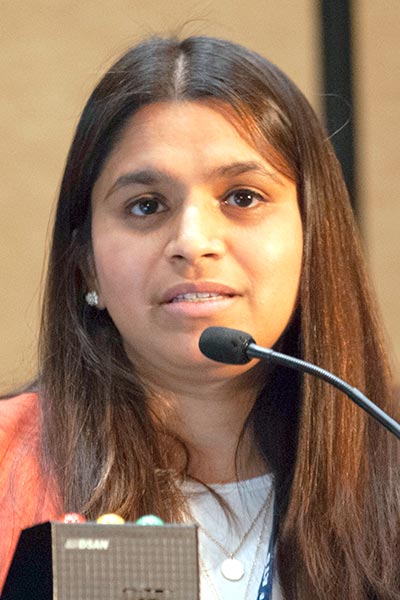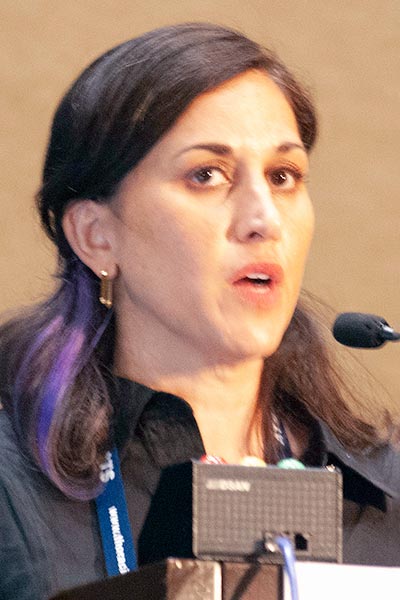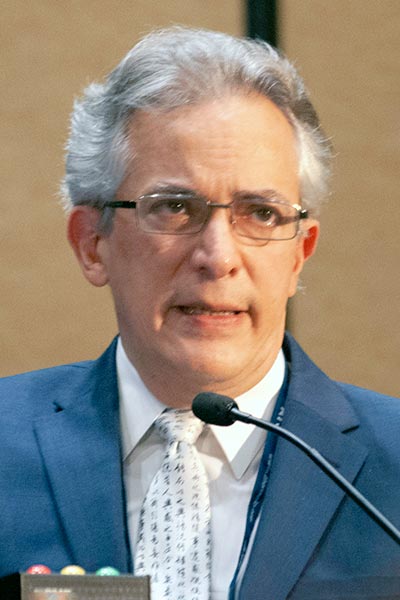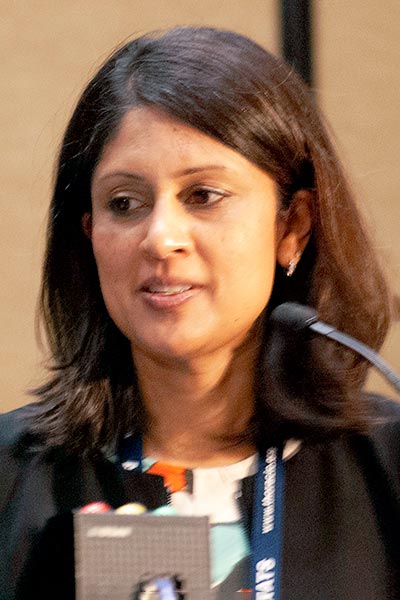Pre-existing threats coupled with the collateral effects of COVID-19 on trainees and early career faculty have risked an entire generation’s professional development, with outsized effects on racial and ethnic minorities, women, and other underrepresented groups in medicine.
During the ATS 2022 session, More Than Making Up for Lost Time: Career Development After COVID-19, on Wednesday, May 18, a diverse panel of experts discussed the challenges facing early career individuals and how the pandemic exacerbated those challenges. Registered ATS 2022 attendees can view the session on demand through June 24.

Jamuna K. Krishnan, MD, MBA, MSc, instructor in medicine, Weill Cornell Medicine and New York Presbyterian Hospital, opened the session with a review of findings from a study looking at trainee emotions and experiences during and after the pandemic.
“The goal of our study was to elicit the needs of critical care fellows as they continue to work in the pandemic, and to understand their experiences to inform the development of meaningful programming to foster the success of trainees,” Dr. Krishnan said.
Guided by the Critical Incident Stress Debriefing crisis intervention model, Dr. Krishnan and her colleagues reached out to program directors and trainees across the country between July 2020 and March 2021 to conduct interviews, convene focus groups, and distribute surveys.
“Among the things we found in our study was that there was a real mix of both positive and negative emotions related to trainee experiences during the pandemic, which was kind of surprising,” Dr. Krishnan said. “From a personal standpoint, when you’re a trainee and you’re mastering skills, such as putting in a central line in a patient who’s dying, you feel proud that you did the procedure successfully, but you also feel sad that the outcome was eventually not a good one. Those sorts of opposing emotions are really difficult to process.”
Other overarching themes that emerged from the study on the pandemic’s impact on career development included little or no time to engage in scholarly work, diminished availability of mentorship opportunities, and a lack of social support from leadership and peers.

Neeta Thakur, MD, MPH, associate professor of medicine, University of California, San Francisco, followed with a talk about the importance of building a diverse pipeline of pulmonary and critical care medicine clinicians.
“This is really important when we talk about representation in medicine, and specifically in the field of pulmonary and critical care medicine, as there is vast underrepresentation of people of color in our workforce right now,” Dr. Thakur said.
According to the most recent data from the Association of American Medical Colleges, Dr. Thakur said that Hispanic and Black people comprise only 6.4 percent and 3.4 percent, respectively, of the U.S. pulmonary and critical care physician workforce.
“The challenges to building a diverse pulmonary medicine pipeline and the barriers that must be overcome are multifaceted and multilevel,” Dr. Thakur said, “We have to make upfront investments with a long-view perspective — that means thinking about how we engage young people early in their life decisions.”

One place to start, she said, is to repair the “leaky STEM pipeline” by growing and expanding youth programs that expose young people from underrepresented groups to the possibility of careers in clinical medicine.
“The journey to equity, diversity, inclusion, and representation follows a challenging but very rewarding path, and it requires a multipronged approach by all key stakeholders,” said Juan C. Celedon, MD, DrPH, ATSF, division chief for pulmonology medicine at UPMC Children’s Hospital of Pittsburgh, and the Niels K. Jerne Professor of Pediatrics, and professor of medicine, epidemiology, and human genetics at the University of Pittsburgh, who talked about establishing a diverse talent pipeline to build careers in pulmonary, critical care, and sleep medicine.
“Concerns about the shortage of scientists and physician-scientists in pulmonary and critical care medicine are accentuated for women and members of groups underrepresented in medicine, and those concerns have only been amplified by the increased clinical demands during the pandemic,” Dr. Celedon said. “Progress is possible and is happening, but we need to continue to be aware of and mitigate implicit bias in the selection of pulmonary and critical care medicine fellows and postdoctoral fellows-in-training grants.”

Sushma K. Cribbs, MD, MSCR, ATSF, associate vice chair of faculty development in the Department of Medicine at Emory University, discussed professional recovery after COVID-19 and how the pandemic led to decreased opportunities for career advancement, unique mental health challenges, and an exacerbation and widening of gender and racial disparities.
“COVID-19 stressors created unique and important challenges that we all faced, and now that the two-year mark has passed, the burdens of these last few years are coming to bear,” Dr. Cribbs said.
Among the impacts of the pandemic on professional development, she said, was reduced research activity, as physician and nurse-scientists were called to clinical duty, as well as reduced access to mentorship and reduced in-person networking, which diminished the ability to connect with others, attend conferences, and get feedback on academic work.
“We need to accept that there is a changing nature of work and how that affects academic productivity, promotion and tenure, professional development programs, and our training and learning environments,” Dr. Cribbs said. “The pandemic has given us, as a specialty, the chance to think about our own core values and preferences, and an opportunity to reinvent ourselves to be more flexible, more compassionate, and more equitable.”
Extend Your Learning Beyond San Francisco with ATS 2025 Conference Highlights

With so many valuable educational opportunities offered during the ATS 2025 International Conference, attendees are often forced to decide which sessions to prioritize. That’s why the Society is offering three ATS 2025 Conference Highlights packages for those unable to attend ATS 2025 San Francisco or attendees interested in continuing their education after the conference. Check out the packages and pick the one that’s right for you. Learn at your own pace, whenever and wherever you are!

